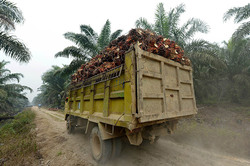Business Mirror | 22 November 2016
Malaysian firm to invest $1 billion in Philippines palm oil plantation
Malaysian firm to invest $1 billion in Philippines palm oil plantation
By Catherine Pillas
A Malaysian company is planning to set up a $1-billion palm-oil plantation in the Philippines, according to the Philippine Economic Zone Authority (Peza).
Peza Director General Charito B. Plaza said Alif Oil Trading Co. requires 128,000 hectares of land for palm oil in Agusan del Sur.
Plaza added that some ancestral lands may be covered by the proposed plantation and that indigenous peoples in the area will be approached before rolling out the project.
“What we are doing now to accommodate the 128,000 hectares is, we’re talking to the Department of Trade and Industry, the local government of Agusan del Sur and the National Commission on Indigenous Peoples [NCIP],” she said in a recent interview.
“We are talking with the clans and the owners of these ancestral domains, but they’ve already signed a memorandum of understanding that these will be converted to special economic zones for the palm-oil industry,” Plaza added.
President Duterte recently flew to Malaysia to strengthen economic cooperation with Asean neighbors as part of the Philippines’s efforts to pursue an “independent foreign policy.”
In a news briefing recently in Kuala Lumpur, Trade Secretary Ramon M. Lopez said the production from the palm-oil project will be exported. Alif Oil Trading Co. will also put up facilities to further process palm oil.
Plaza also said the $1 billion is just an “initial estimate” as refinery plants will likely be set up in Mindanao and Palawan.
The Peza chief hinted at the possibility that the Malaysian firm may also produce oil for the domestic market.
Currently, the palm-oil industry is being regulated by the Philippine Coconut Authority (PCA), an attached agency of the Department of Agriculture (DA).
Philippine Palm Oil Development Council Inc. (PPDCI) Vice President Erwin Garcia earlier pushed for the creation of a separate agency for palm oil to hasten the industry’s development and “unlock” the potential of palm-oil production, which is badly in need of government support.
All efforts to sustain the palm-oil industry in the Philippines have, so far, been led by the private sector, Garcia said.
Aside from the creation of the agency, Garcia called on the government to put in place a “concrete” plan to help palm-oil producers.
“The government should have a clear vision on how they will help the farmers,” he said.
The PPDCI said it proposed an industry-development road map to the government, but the outgoing administration “just sat on it.”
According to Garcia, the proposed 10-year road map outlined the challenges faced by the industry, as well as the strategies to overcome these.
One of the targets set in the road map, he said, is to address the shortage in palm-oil production in the country.
“Right now, we have to plant around 200,000 hectares of oil palm just to be self-sufficient. This is enough to wipe out our importation of palm oil. But, we are planting palm oil in only 5,000 hectares per year,” Garcia said.














